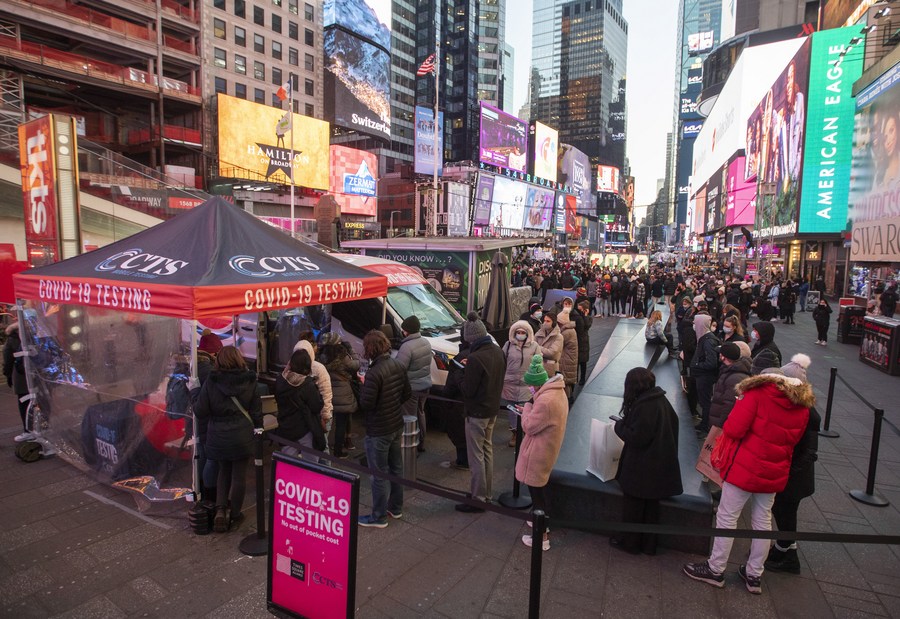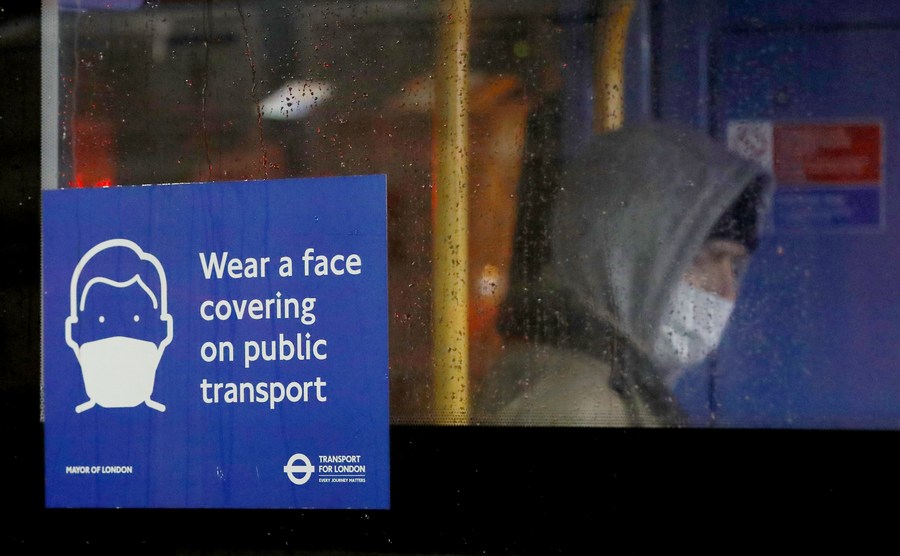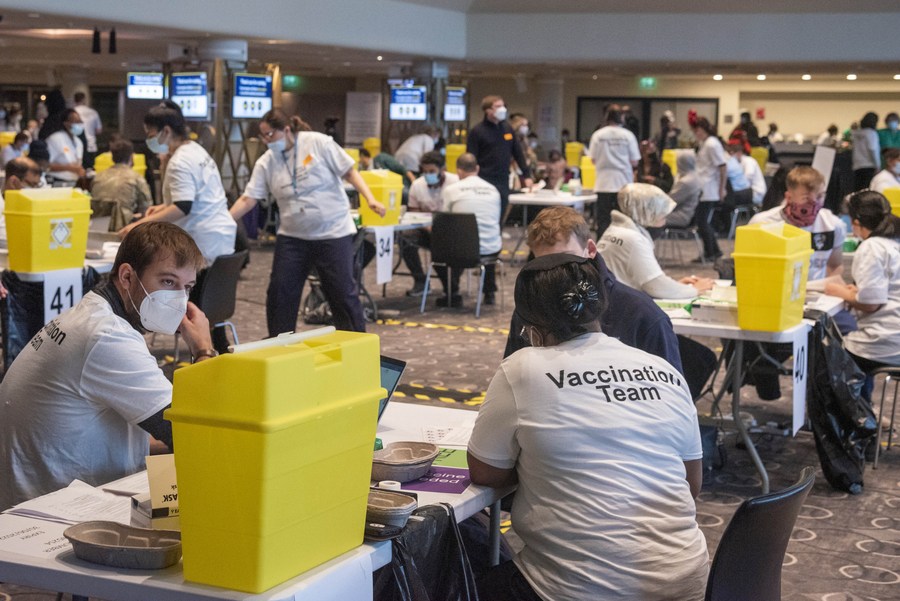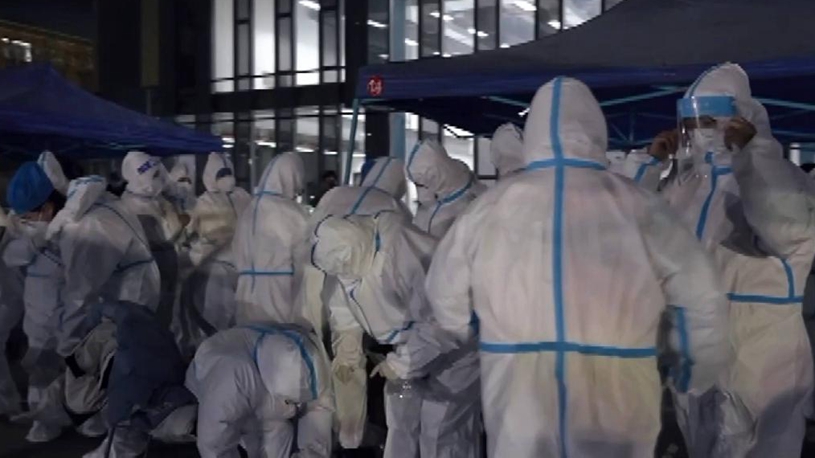
People wait in line for COVID-19 tests at a mobile testing site on Times Square in New York, the United States, Dec. 20, 2021. (Xinhua/Wang Ying)
-- The lightning spread of the Omicron variant in the United States has driven daily COVID-19 new cases to a record high of over 510,000 on Monday, which is now straining hospitals across America, pushing them to the brink of collapse.
-- As scientists are learning more about the new variant, the hard-hit Europe is scrambling to ramp up tests and urging people to get booster shots.
BEIJING, Dec. 29 (Xinhua) -- The United States and European countries have shattered records for daily COVID-19 cases, driven by the Omicron variant that is sweeping the globe and hampering global efforts to tame the coronavirus.
U.S. CASES HIT RECORD HIGH
The lightning spread of the Omicron variant in the United States has driven daily COVID-19 new cases to a record high of over 510,000 on Monday, and the highly transmissible variant accounted for nearly 60 percent of sequenced U.S. COVID-19 cases for the week ending Dec. 25, according to the country's Centers for Disease Control and Prevention (CDC).
The surge is now straining hospitals across America, pushing them to the brink of collapse.
With a likely spike in infections after the Omicron variant was identified, Rhode Island emergency doctors reportedly warned earlier this month that any new surge of patients would "lead to collapse of the state health care system."
The plight of U.S. hospitals has been compounded by an exodus of health care workers who have quit or opted for other jobs.
"It's bad news for COVID patients and it's bad news for everybody else who needs hospital-level care," Dr Eric Toner, a senior scholar at the Johns Hopkins Center for Health Security, was quoted as saying by U.S. broadcaster NPR.
EUROPE BUCKLES UNDER OMICRON
France reported on Tuesday 179,807 confirmed COVID-19 cases in a 24-hour period, Europe's highest number of daily cases. The grim milestone came as the continent grapples with the now dominant Omicron variant.
The French government authorized on Tuesday the sale of antigenic tests in supermarkets until the end of January. The French prime minister announced a monthly bonus of 100 euros to all intensive care medical staff.

A man wearing a face mask is seen on a bus on Christmas Eve in London, Britain, Dec. 24, 2021. (Xinhua/Li Ying)
"In the context of a very sharp increase in the incidence rate, due to the spread of the Delta and Omicron variants and a demand for examinations and screening tests unprecedented since the start of the health crisis, there is a need to diversify the supply and sales circuits of the self-tests", the government said in a decree.
France was not alone. Britain also reported a record daily high of nearly 130,000 cases, as did Portugal, Italy and Greece.
Britain's National Health Service emergency departments said they could be pushed "over the edge" and would have to prioritize the most vulnerable patients as the spread of the Omicron variant puts staff in self-isolation.
"ROLL UP YOUR SLEEVES"
British researchers have analyzed the possible impact that a booster shot will have on Omicron and said it could provide around 85 percent protection against severe illness and decrease the chance of hospitalization.
"While our brilliant scientists learn more about the new Omicron variant, we need to do everything we can to strengthen our defences and vaccines are the best way to do that," said British Health Secretary Sajid Javid.
"This is a national mission and we all have a role to play -- so roll up your sleeves and get protected as soon as you can," he added.

Photo taken on Dec. 19, 2021 shows a general view of NHS (National Health Service) COVID Vaccine Center at Wembley Stadium in London, Britain. (Photo by Ray Tang/Xinhua)
Although experts point to boosters as the best means of preventing severe illness, just four in 10 eligible Americans have received one.
Several factors explain the low rate. In the United States, public health directives can take a long time to circulate and have historically reached marginalized populations even slower, according to media reports.
There has been a months-long debate between experts at the CDC and the Food and Drug Administration on whether there was a need for boosters for the whole population or only the most vulnerable, causing confusion among the public.■












